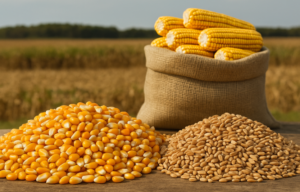
In its January inflation report, the National Bank of Ukraine increased its estimate for the grain and legume harvest in 2025 to 63.5 million tons from 61.5 million tons in its October report, while lowering its estimate for the oilseed harvest to 18.6 million tons from 19.3 million tons.
“The estimate for the oilseed harvest in 2025 has been revised downward by 0.7 million tons due to a slightly lower-than-expected soybean harvest and the inability to harvest part of the sunflower crop due to unfavorable weather conditions and the complex security situation in the regions where the crop is grown,” the document says.
This is the second such revision of estimates by the NBU: in last year’s July inflation report, it expected a grain harvest of 57.9 million tons and oilseeds of 21.0 million tons. In 2024, their harvest amounted to 56.2 million tons and 21.3 million tons, respectively.
The National Bank specified, with reference to data from the Ministry of Agrarian Policy, that as of the end of 2025, 89% of corn and 95% of grain and legume crops had been harvested. At the same time, thanks to significantly higher corn yields, the total harvest of grains and legumes exceeded the previous year’s figure: according to preliminary data from the Ministry of Agrarian Policy and Food, by 7.4% or 3% when compared with the final data from the State Statistics Service.
As for the 2026 harvest, the NBU maintained its forecast for grains at 62.9 million tons and lowered its forecast for oilseeds from 21.4 million tons to 20.9 million tons.
“In 2026–2027, the production volumes of grains and legumes (62.9 million tons and 63.5 million tons, respectively) will remain close to the current level and will grow more significantly in 2028 (65.0 million tons). Oilseed production will grow moderately in 2026–2028 (to 22 million tons at the end of the forecast period) amid a gradual improvement in productivity in the industry, but it will be held back by climate change in the southern regions, exacerbated by the destruction of the Kakhovka hydroelectric power plant, as well as security risks,” according to the National Bank.
At the same time, the NBU continues to assume that livestock farming will continue to make a negative contribution to the added value of agriculture due to the expected reduction in livestock numbers and pressure from production costs. However, this contribution will be less than previously expected due to the growth of poultry farming and the active recovery of pig farming after significant losses in 2024, according to the Inflation Report.
Despite the increase in harvest in 2025 compared to 2024, according to the Ministry of Agrarian Policy and Food, freight transportation for export in the fourth quarter of last year decreased by 23% y/y (compared to 34% y/y in the third quarter), primarily due to a further decline in maritime transport by 22% y/y (compared to 30% y/y in the third quarter).
As specified by the National Bank, rail transport decreased by 28% y/y (compared to 58% y/y in the third quarter), and road transport decreased by 42% y/y (compared to 53% y/y in the third quarter).
According to the State Statistics Service, the decline in freight turnover accelerated to 18% y/y on average in Q4 from 13% in Q3. Passenger turnover growth slowed to 0% y/y on average in Q4 (compared to an average growth of 7% in Q3).

Coffee prices fell on Thursday amid expectations of a high harvest in Brazil, the world’s largest coffee supplier.
Arabica futures fell 0.2% to $3.0785 per pound at the end of trading in New York yesterday. This is the lowest price in five months.
Brazil’s new coffee crop, which will begin harvesting in a couple of months, could reach a record 75.8 million bags, Reuters reports, citing a forecast by EISA. One bag weighs 60 kg.
EISA expects the Arabica coffee harvest to amount to 48 million bags and the Robusta harvest to amount to 27.8 million bags.
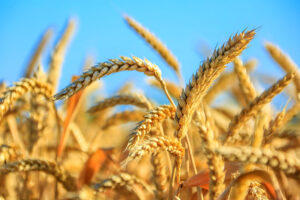
As of December 25, 2025, farmers harvested 57.597 million tons of grain and legumes from 10.55 million hectares, which is 94% of the area, as well as 17.4 million tons of oilseeds from 8.13 million hectares, which is 97.7% of the area they sowed.
According to operational information from the Ministry of Economy, Environment, and Agriculture on the progress of the harvest, 26.45 million tons of corn have been harvested from 3.84 million hectares, 22.96 million tons of wheat from 5.05 million hectares, 5.42 million tons of barley from 1.36 million hectares, 672,500 tons of peas from 275,100 hectares, and 82,700 tons of buckwheat from 10,000 hectares. 5.42 million tons from 1.36 million hectares, peas – 672,500 tons from 275,100 hectares, buckwheat – 82,700 tons from 59,400 hectares, millet – 62,100 tons from 35,800 hectares. The harvest of other cereals and legumes this year reached 934,100 tons from 331,100 hectares as of December 25.
As for oilseeds, as of December 25, the harvest amounted to 3.317 million tons of rapeseed harvested from 1.26 million hectares, 4.81 million tons of soybeans from 2.028 million hectares, and 9.227 million tons of sunflower from 4.838 million hectares.
This year, 10.989 million tons of sugar beets were harvested from 198,800 hectares.
The yield of agricultural crops in Ukraine in the 2025 season was wheat – 45.5 cwt/ha, barley – 39.8 cwt/ha, peas – 24.4 cwt/ha, 71.3 cwt/ha, buckwheat – 13.9 cwt/ha, millet – 17.4 cwt/ha, rapeseed – 26.3 cwt/ha, soybeans – 23.7 cwt/ha, sunflowers – 19.1 cwt/ha, sugar beets – 552.7 cwt/ha.
The Ministry of Economy stated that the largest gap between the actual and projected gross harvest in the grain and legume segment was demonstrated by corn – 87% of the plan, millet (88%), buckwheat (97%), wheat and barley (98%), and buckwheat (97%). Other grains and legumes were harvested at 85% of expectations.
Oil crops showed a higher percentage of fulfillment of the Ministry of Economy’s forecasts: rapeseed – 102%, soybeans – 98%, sunflowers – 93%.
The forecast for sugar beets turned out to be the most realistic – 100% of the plan.
As reported, the Ministry of Economy estimated the area under wheat in 2025 at 5.135 million hectares, a year earlier this figure was 4.884 million hectares (+5.1%), barley – 1.386 million hectares against 1.398 million hectares a year earlier (-0.1%), peas – 277.8 thousand hectares against 210.4 thousand hectares (+32%), corn – 4.399 million hectares against 4.070 million hectares (+8.1), buckwheat – 61.4 thousand hectares against 90.3 thousand hectares (-32%), millet – 40.5 thousand hectares against 92.6 thousand hectares (-56.3%), other cereals and legumes – 345.7 thousand hectares against 360.3 thousand hectares (-4.1%).
The production area under rapeseed in 2025 was 1.24 million hectares compared to 1.26 million hectares a year earlier (-1.6%), soybeans – 2.063 million hectares compared to 2.714 million hectares (-24%), sunflowers – 5.189 million hectares compared to 5.028 million hectares (+3.2%).
The area under sugar beets this year was reduced by 21.5% to 199 thousand hectares.
Ukrainian farmers finished harvesting on November 22, 2024. At that time, 98% of the planned harvest had been obtained.
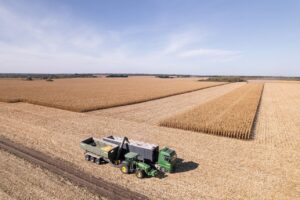
The crop division of the Alebor Group grain trading company has completed the 2025 production season, the company’s press service reported on Facebook.
According to the report, the company’s specialists grew and harvested wheat from 2,000 hectares with a yield of over 7 tons/hectare, corn from 1,100 hectares with a yield of 14.5 tons/hectare, rapeseed from 1,500 hectares with a yield of 3.6 tons per hectare, and sunflower from 1,800 hectares with a yield of 3.85 tons per hectare.
Alebor Group is a trading company founded in 2006 in the Cherkasy region. Its structure includes the Khristinivskoye Grain Receiving Enterprise (with a storage capacity of 74,000 tons of grain), the Voronovitske Grain Receiving Enterprise (104,000 tons of grain), Chesne Grain Receiving Enterprise (27,500 tons of grain), transport companies Boleko and Avtoera with a fleet of 210 heavy-duty grain trucks, and construction company Alebor Real Estate.
According to information on the company’s website, Alebor Group is one of the top 20 grain trading companies in Ukraine, exporting about 2 million tons of grain annually. The group has its own land bank of 6,500 hectares. The company’s founder is Oleksiy Kustov.
KMZ Industries is the largest manufacturer of elevator equipment in Ukraine and produces a full range of products, including silos, grain dryers, transport equipment, and separators, as well as providing automation and installation services.
According to the company, it has built more than 5,000 facilities. KMZ Industries silos with a total volume of more than 12.5 million cubic meters are in operation.
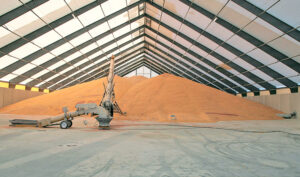
The Food and Agriculture Organization of the United Nations (FAO) has completed the distribution of 615 modular grain storage facilities to small and medium-sized farms in seven frontline areas, the FAO press service reported on Facebook.
The FAO specified that this initiative was implemented with the support of the governments of Canada and Japan in close cooperation with the Ministry of Economy, Environment, and Agriculture. The FAO is convinced that the program contributes to stabilizing the work of farms, preventing post-harvest losses, and ensuring the continuity of agricultural production.
Farmers could apply to participate in the program through the State Agrarian Register (DAR). In 2025, the FAO received 747 applications from producers who cultivate between 200 and 1,000 hectares. After verification, 615 farms were selected to receive modular grain storage facilities. The distribution took place in seven regions: Chernihiv (62), Dnipropetrovsk (116), Kharkiv (124), Kherson (14), Kirovohrad (84), Mykolaiv (128), and Odesa (87).
This initiative is part of a broader Grain Storage Support Strategy that FAO and partners have been implementing since 2022 in response to a critical shortage of storage capacity. During this time, Ukrainian agricultural producers have received a wide range of storage solutions – more than 37,000 grain sleeves, 105 sets of loading and unloading equipment, and a total of 859 modular grain storage facilities. Collectively, this support has enabled farmers across Ukraine to preserve more than 8 million tons of grain and sustain agricultural production in wartime conditions.
Despite significant progress, the lack of storage infrastructure remains a key constraint to the recovery of the agricultural sector, especially in frontline and recently liberated areas, the FAO stressed. As preparations for the 2026 season get underway, the sustainable development of modern and secure grain storage facilities will remain critical to protecting livelihoods and preserving national food production.
“For farmers, the ability to safely store their harvest is not just about grain. It’s about peace of mind, about the confidence that months of hard work will not be lost. These storage facilities give Ukrainian farmers what is especially needed today in times of war: stability and the ability to look to the future with hope. We will continue to support them on this path,” assured Shakhnoza Muminova, Head of the FAO Office in Ukraine.
FAO, together with its partners, plans to provide support to approximately 100 more farmers in early 2026, but the scale of needs far exceeds available resources. Strengthened cooperation and continued active involvement of the international community will be key to enabling farmers to withstand ongoing challenges and contribute to Ukraine’s long-term recovery, the organization believes.
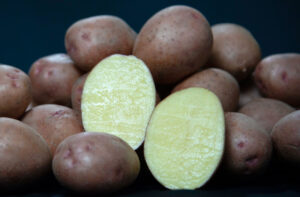
In Ukraine, the area under potatoes in the 2025 season increased by 25% compared to last year, and thanks to favorable weather conditions, the yield was also a quarter higher, so it can be assumed that the harvest of Ukrainians’ second bread is 50% higher than last year, said Mykola Furdyga, director of the Potato Institute.
“It is very easy to calculate how much potatoes we produce. If the average farm price is 8 UAH/kg, and last year it was 20 UAH/kg, then I think we have 50% more production: production areas have expanded by 25% and the harvest has increased by 25% thanks to weather conditions,“ he said at the conference ”The state of development of the potato industry and the potential of processing enterprises in Volyn.”
Furdyga noted that Ukraine does not need such a volume of grown potatoes even in the case of deep processing (into chips and starch – IF-U).
Commenting on Ukraine’s import of more than 123,000 tons of potatoes in the 2024-2025 marketing year, the scientist explained that this record volume of sales abroad was caused by the unusual weather conditions of 2024 (Ukraine experienced a “record” drought – IF-U). Therefore, the state was forced to import potatoes to meet domestic food needs. European countries willingly supplied Ukraine with products due to their attractive price. At the same time, potatoes from Egypt did not dominate the market, but occupied their traditional niche in the off-season (February-March – IF-U), he noted.
In addition, Ukraine traditionally imports seed potatoes from leading breeding companies in the European Union, the director of the Potato Institute recalled.
Furdyga stated that since the beginning of the war, there has been a trend in Ukraine toward a reduction in potato cultivation in households and an expansion of production areas for this crop in farms and even in agricultural holdings. He explained this trend by the departure of the population from villages abroad and mobilization.
“For example, in Vinnytsia and Zhytomyr regions, there are villages where households used to plant 30 hectares of potatoes, and now if they plant 2 hectares, that’s still good,” he said, adding that potato cultivation is becoming unprofitable and labor-intensive for households.
Furdyga estimated the share of domestic potato varieties in national production at around 10-12%, given that they are mainly grown by small producers and households.
“Of course, we would like to have a larger market share, but this is the situation at the moment. I can only boast that in the 2025 season, domestic varieties were grown by the farms of Biotech Ltd. and Brovary Kartoplya Ltd. in the Kyiv region and STOV Desna in the Chernihiv region. In total, they propagated domestic varieties for further sale on an area of about 300 hectares,” said the director of the Potato Institute.
As reported, in 2024, due to unfavorable weather conditions and, in particular, drought, Ukraine’s potato harvest was 18% lower, i.e., by 4 million tons, to approximately 17.36 million tons, compared to 21.36 million tons in 2023.